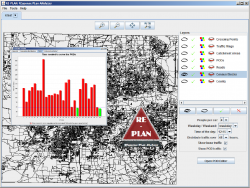"A Computational Framework for Assessing the Feasibility of Bio-emergency Response"

Summary
The threat of possible bio-emergencies brought upon by pandemics or bioterrorism necessitates the development of response plans that will protect or treat the population in the affected geographic region. One of the approaches to provide necessary public health services to the population during a bio-emergency is based on a system of dispensing points or service clinics that are located throughout the region. These points of dispensing (PODs) are clinics that will be established in the event of a bio-emergency. Their placement and configuration is the central question of this proposal as it will determine if established guidelines for the treatment of the population can be met.
The development of response plans represents a multivariate optimization problem as the availability of human resources (e.g., nurses, physicians, clerks) and infrastructural resources (e.g roadways, clinic locations) will affect response plan-feasibility. This proposal addresses the need to facilitate the development of response plans through the availability of a computational framework that combines data from disparate sources allowing for the assessment of response plans. Its focus is on the development of computational methods that support the optimization of response scenarios involving the placement of distribution points and clinics at specific locations within a geographic region.
The feasibility assessment of existing response plans requires that the multiple determinants that drive the decision process for the design and location of PODs must be represented within computational tools. Thesetools will not replace but supplement the planning process, as they bring together information from multiple, often disparate sources to determine whether or not a specific response plan can meet mandated guidelines. To achive this goal, this research effort will utilize existing collaborative relationships with public health experts who are directly involved in the planning process.
Given constraints under which response plans are developed, this project seeks to develop methodology to optimize the efficiency of a proposed plan by determining an optimal resource allocation. Thereby, it has to be considered that the theoretical optima may not be achievable. Nevertheless, an acceptable feasible solution is being derived. Although a given plan may be optimal for a geographically delineated region, improvements by cross-regional efforts might be achieved. Computational methods for the optimization of resource allocation and POD placement are being developed as part of the proposed project.
Personnel
Armin R. Mikler - PI
Chetan Tiwari - Co-I
Tamara Jimenez (Schneider) - Faculty
Marty O'Neill II - Data Analyst
Richard Goodrum - Research Associate
Saratchandra Indrakanti- Research Assistant
Jessica Beckham - Research Assistant
Josh Urbanovsky - Research Assistant
Publications
• Accepted: Tamara Jimenez, Armin R Mikler, Chetan Tiwari: "RE-PLAN: A Novel Space Partitioning Algorithm to Improve Resource Allocation for Non-homogeneous Populations". Transactions on Systems, Man, and Cybernetics - Part A: Systems and Humans
• Published: Martin O'Neill II, Armin R Mikler, Tamara Schneider: "An Extensible Software Architecture to Facilitate Disaster Response Planning" in the Proceedings of the 2011 International Conference on Bioinformatics and Computational Biology, July 18-21, 2011, Las Vegas.
Contact Information
Armin R. Mikler
mikler@unt.edu
(940) 565-4279

